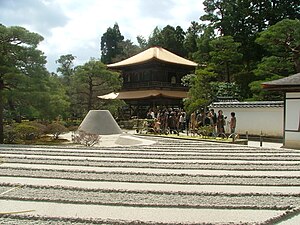Ginkakuji
| Jishō-ji 慈照寺 |
|
|---|---|

The kannonden at Jishō-ji,
commonly known as the Silver Pavilion (Ginkaku) |
|
| Basic information | |
| Location | 2 Ginkakuji-chō, Sakyō-ku, Kyōto, Kyoto Prefecture |
| Affiliation | Zen, Rinzai sect, Shōkoku-ji school |
| Deity | Shaka Nyorai (Śākyamuni) |
| Country | Japan |
| Website | http://www.shokoku-ji.jp/g_about.html# |
| Architectural description | |
| Founder | Ashikaga Yoshimasa |
| Completed | 1490 |
Ginkaku-ji (銀閣寺?, lit. "Temple of the Silver Pavilion"), officially named Jishō-ji (慈照寺?, lit. "Temple of Shining Mercy"), is a Zen temple in the Sakyo ward of Kyoto, Japan. It is one of the constructions that represents the Higashiyama Culture of the Muromachi period.
Ashikaga Yoshimasa initiated plans for creating a retirement villa and gardens as early as 1460; and after his death, Yoshimasa would arrange for this property to become a Zen temple. The temple is today associated with the Shokoku-ji branch of Rinzai Zen.
The two-storied Kannon-den (観音殿?, Kannon hall), is the main temple structure. Its construction began February 21, 1482 (Bummei 14 , 4th day of the 2nd month). The structure's design sought to emulate the golden Kinkaku-ji which had been commissioned by his grandfather Ashikaga Yoshimitsu. It is popularly known as Ginkaku, the "Silver Pavilion" because of the initial plans to cover its exterior in silver foil; but this familiar nickname dates back only as far as the Edo period (1600–1868).
...
Wikipedia
